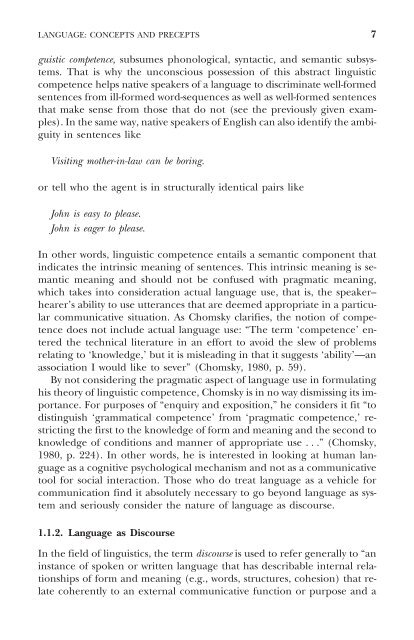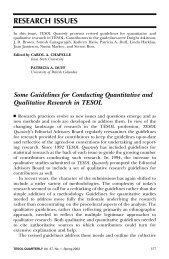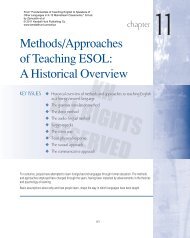- Page 2 and 3: UNDERSTANDING LANGUAGETEACHINGFrom
- Page 4 and 5: UNDERSTANDING LANGUAGETEACHINGFrom
- Page 6 and 7: Dedicated toLanguage teachers every
- Page 8 and 9: Brief ContentsPreface: The Pattern
- Page 10 and 11: ContentsPreface: The Pattern Which
- Page 12 and 13: CONTENTSxi5.1.2. Theory of Language
- Page 14 and 15: PrefaceThe Pattern Which Connects
- Page 16 and 17: PREFACExvedly systematic and theory
- Page 18 and 19: PREFACExviiIt is important to stres
- Page 20 and 21: LANGUAGE, LEARNING,AND TEACHINGPart
- Page 22 and 23: Chapter1Language: Concepts and Prec
- Page 24 and 25: LANGUAGE: CONCEPTS AND PRECEPTS 5be
- Page 28 and 29: LANGUAGE: CONCEPTS AND PRECEPTS 9ac
- Page 30 and 31: LANGUAGE: CONCEPTS AND PRECEPTS 11t
- Page 32 and 33: LANGUAGE: CONCEPTS AND PRECEPTS 13T
- Page 34 and 35: LANGUAGE: CONCEPTS AND PRECEPTS 15t
- Page 36 and 37: LANGUAGE: CONCEPTS AND PRECEPTS 17n
- Page 38 and 39: LANGUAGE: CONCEPTS AND PRECEPTS 19A
- Page 40 and 41: LANGUAGE: CONCEPTS AND PRECEPTS 21T
- Page 42 and 43: LANGUAGE: CONCEPTS AND PRECEPTS 23t
- Page 44 and 45: Chapter2Learning: Factors and Proce
- Page 46 and 47: LEARNING: FACTORS AND PROCESSES 27i
- Page 48 and 49: LEARNING: FACTORS AND PROCESSES 29F
- Page 50 and 51: LEARNING: FACTORS AND PROCESSES 31F
- Page 52 and 53: LEARNING: FACTORS AND PROCESSES 33h
- Page 54 and 55: LEARNING: FACTORS AND PROCESSES 35n
- Page 56 and 57: LEARNING: FACTORS AND PROCESSES 37r
- Page 58 and 59: LEARNING: FACTORS AND PROCESSES 39e
- Page 60 and 61: LEARNING: FACTORS AND PROCESSES 41o
- Page 62 and 63: LEARNING: FACTORS AND PROCESSES 43o
- Page 64 and 65: LEARNING: FACTORS AND PROCESSES 452
- Page 66 and 67: LEARNING: FACTORS AND PROCESSES 47u
- Page 68 and 69: LEARNING: FACTORS AND PROCESSES 492
- Page 70 and 71: LEARNING: FACTORS AND PROCESSES 51e
- Page 72 and 73: LEARNING: FACTORS AND PROCESSES 53d
- Page 74 and 75: Chapter3Teaching: Input and Interac
- Page 76 and 77:
TEACHING: INPUT AND INTERACTION 57I
- Page 78 and 79:
TEACHING: INPUT AND INTERACTION 59s
- Page 80 and 81:
TEACHING: INPUT AND INTERACTION 611
- Page 82 and 83:
TEACHING: INPUT AND INTERACTION 63C
- Page 84 and 85:
TEACHING: INPUT AND INTERACTION 65l
- Page 86 and 87:
TEACHING: INPUT AND INTERACTION 67c
- Page 88 and 89:
TEACHING: INPUT AND INTERACTION 69t
- Page 90 and 91:
TEACHING: INPUT AND INTERACTION 71e
- Page 92 and 93:
TEACHING: INPUT AND INTERACTION 73n
- Page 94 and 95:
TEACHING: INPUT AND INTERACTION 75T
- Page 96 and 97:
TEACHING: INPUT AND INTERACTION 77S
- Page 98 and 99:
TEACHING: INPUT AND INTERACTION 79d
- Page 100 and 101:
LANGUAGE TEACHINGMETHODSPart Two
- Page 102 and 103:
Chapter4Constituents and Categories
- Page 104 and 105:
CONSTITUENTS AND CATEGORIES OF METH
- Page 106 and 107:
CONSTITUENTS AND CATEGORIES OF METH
- Page 108 and 109:
CONSTITUENTS AND CATEGORIES OF METH
- Page 110 and 111:
CONSTITUENTS AND CATEGORIES OF METH
- Page 112 and 113:
FIG. 4.1. Categories of language te
- Page 114 and 115:
CONSTITUENTS AND CATEGORIES OF METH
- Page 116 and 117:
Chapter5Language-Centered Methods5.
- Page 118 and 119:
LANGUAGE-CENTERED METHODS 99widely
- Page 120 and 121:
LANGUAGE-CENTERED METHODS 101due co
- Page 122 and 123:
LANGUAGE-CENTERED METHODS 103Althou
- Page 124 and 125:
LANGUAGE-CENTERED METHODS 105chanic
- Page 126 and 127:
LANGUAGE-CENTERED METHODS 107They a
- Page 128 and 129:
LANGUAGE-CENTERED METHODS 109as int
- Page 130 and 131:
LANGUAGE-CENTERED METHODS 111primar
- Page 132 and 133:
LANGUAGE-CENTERED METHODS 113for ad
- Page 134 and 135:
LEARNER-CENTERED METHODS 115So argu
- Page 136 and 137:
LEARNER-CENTERED METHODS 117charact
- Page 138 and 139:
LEARNER-CENTERED METHODS 119It must
- Page 140 and 141:
LEARNER-CENTERED METHODS 121order t
- Page 142 and 143:
LEARNER-CENTERED METHODS 123The sam
- Page 144 and 145:
LEARNER-CENTERED METHODS 125edge fo
- Page 146 and 147:
LEARNER-CENTERED METHODS 127Learner
- Page 148 and 149:
LEARNER-CENTERED METHODS 129the con
- Page 150 and 151:
LEARNER-CENTERED METHODS 131based c
- Page 152 and 153:
LEARNER-CENTERED METHODS 133merely
- Page 154 and 155:
LEARNING-CENTERED METHODS 135(see H
- Page 156 and 157:
LEARNING-CENTERED METHODS 137The la
- Page 158 and 159:
LEARNING-CENTERED METHODS 139fact t
- Page 160 and 161:
LEARNING-CENTERED METHODS 141Learni
- Page 162 and 163:
LEARNING-CENTERED METHODS 143hensio
- Page 164 and 165:
LEARNING-CENTERED METHODS 145Person
- Page 166 and 167:
LEARNING-CENTERED METHODS 147with r
- Page 168 and 169:
LEARNING-CENTERED METHODS 149Furthe
- Page 170 and 171:
LEARNING-CENTERED METHODS 151Studen
- Page 172 and 173:
LEARNING-CENTERED METHODS 1531. Dia
- Page 174 and 175:
LEARNING-CENTERED METHODS 155Berns
- Page 176 and 177:
LEARNING-CENTERED METHODS 157 how t
- Page 178 and 179:
POSTMETHOD PERSPECTIVESPart Three
- Page 180 and 181:
Chapter8Postmethod Condition8. INTR
- Page 182 and 183:
POSTMETHOD CONDITION 163the teacher
- Page 184 and 185:
POSTMETHOD CONDITION 165municative
- Page 186 and 187:
POSTMETHOD CONDITION 167Myth #5: Me
- Page 188 and 189:
POSTMETHOD CONDITION 169 it breeds
- Page 190 and 191:
POSTMETHOD CONDITION 171essentials
- Page 192 and 193:
POSTMETHOD CONDITION 173prove pract
- Page 194 and 195:
POSTMETHOD CONDITION 175American au
- Page 196 and 197:
POSTMETHOD CONDITION 177Scharle & S
- Page 198 and 199:
POSTMETHOD CONDITION 179age. That i
- Page 200 and 201:
POSTMETHOD CONDITION 181well. Their
- Page 202 and 203:
POSTMETHOD CONDITION 183student tea
- Page 204 and 205:
Chapter9Postmethod Pedagogy9. INTRO
- Page 206 and 207:
POSTMETHOD PEDAGOGY 187refer to spe
- Page 208 and 209:
POSTMETHOD PEDAGOGY 189from L1 to L
- Page 210 and 211:
POSTMETHOD PEDAGOGY 1919.1.3. The E
- Page 212 and 213:
POSTMETHOD PEDAGOGY 193neously duri
- Page 214 and 215:
POSTMETHOD PEDAGOGY 195professional
- Page 216 and 217:
POSTMETHOD PEDAGOGY 197According to
- Page 218 and 219:
POSTMETHOD PEDAGOGY 199‘global’
- Page 220 and 221:
POSTMETHOD PEDAGOGY 201book, Beyond
- Page 222 and 223:
POSTMETHOD PEDAGOGY 203posed to com
- Page 224 and 225:
POSTMETHOD PEDAGOGY 205ties of thei
- Page 226 and 227:
POSTMETHOD PEDAGOGY 207promote lear
- Page 228 and 229:
POSTMETHOD PEDAGOGY 209FIG. 9.1. Th
- Page 230 and 231:
POSTMETHOD PEDAGOGY 2111.6. Again i
- Page 232 and 233:
POSTMETHOD PEDAGOGY 213informed and
- Page 234 and 235:
Chapter10Postmethod Predicament10.
- Page 236 and 237:
POSTMETHOD PREDICAMENT 217for criti
- Page 238 and 239:
POSTMETHOD PREDICAMENT 219The visib
- Page 240 and 241:
POSTMETHOD PREDICAMENT 2211996). Fu
- Page 242 and 243:
POSTMETHOD PREDICAMENT 223teachers
- Page 244 and 245:
POSTSCRIPT 225and relevant theory o
- Page 246 and 247:
ReferencesAllwright, R. L. (1984).
- Page 248 and 249:
REFERENCES 229Bloomfield, L. (1942)
- Page 250 and 251:
REFERENCES 231Corder, S. P. (1967).
- Page 252 and 253:
REFERENCES 233Gardner, R. C., & Lam
- Page 254 and 255:
REFERENCES 235Kumaravadivelu, B. (1
- Page 256 and 257:
REFERENCES 237MacWhinney, B. (1987)
- Page 258 and 259:
REFERENCES 239Prabhu, N. S. (1985).
- Page 260 and 261:
REFERENCES 241Snow, C. E., & Fergus
- Page 262 and 263:
REFERENCES 243Woods, D. (1996). Tea
- Page 264 and 265:
Author IndexAAbelson, R., 51, 239Ab
- Page 266 and 267:
AUTHOR INDEX 247Harley, 186, 192Har
- Page 268 and 269:
AUTHOR INDEX 249Slimani, A., 71, 24
- Page 270 and 271:
Subject IndexAAcademic autonomy, 17
- Page 272 and 273:
SUBJECT INDEX 253Emotion, 66, 92, 1
- Page 274 and 275:
SUBJECT INDEX 255Learning-centered
- Page 276 and 277:
SUBJECT INDEX 257Regularity, 79, 10




